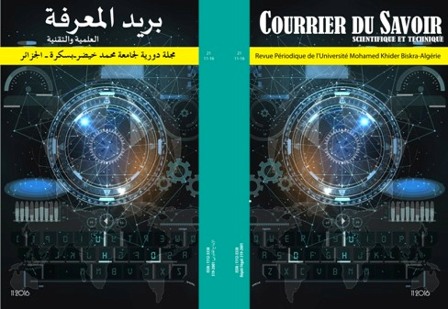MEAN SHIFT BASED OBJECT TRACKING: THE EFFECT OF COLOR SPACE
Résumé
The mean shift algorithm is widely used in object tracking because of its speed, efficiency and simplicity. This algorithm is used to track the location of a non rigid object in image sequences using the object's color histogram. Mean shift tracker maximizes iteratively the appearance similarity by comparing the color histogram of the target model and the target candidate. In this paper we focus on studying the effect of color spaces (HSV, YCrCb, YIQ, YUV, I1I2I3 Lab) on object tracking by mean shift algorithm since this algorithm is based on color information (color histogram) and traditional color histogram uses only the RGB color space. The experimental results show that each color space can influence the tracking robustness for different color targets having the same background.Références
[1] A. Yilmaz, O. Javed, and M. Shah, “Object tracking: A survey,” ACM Computing Surveys, vol. 38, no. 4, pp. 13-57, 2006.
[2] D. Comaniciu, V. Ramesh, and P. Meer, “Kernel-based object tracking,” IEEE Trans. Pattern Anal. Mach. Intell, vol. 25, pp. 564-577, May 2003.
[3] Q. Zhao, W. Yao, J. Xie, “Research on object tracking with occlusion”, WIT Transaction on information and Communication Technologies, vol. 51, pp. 537-545, 2014.
[4] J. Zhao, W. Qiao, G-Z. Men, “An approach based on mean shift and kalman filter for target tracking under occlusion”, International Conference on Machine Learning and Cybernetics, vol. 4, pp. 2058-2062, 2009.
[5] Z. Wen, Z. Cai, “ A robust tracking approach using mean shift ”, Proceedings of the Third International Conference on Natural Computation, Vol.2, pp.170-174, Aug 2007.
[6] K. Fukunaga and L. Hostetler, “The Estimation of the Gradient of a Density Function, with Applications in Pattern Recognition”, IEEE Tran. IT, Vol.21, 1975, pp 32-40.
[7] K. Bai, W. Liu, “Improved object tracking with particle filter and mean shift”, Proceedings of the IEEE International Conference on Automation and Logistics. pp. 431-435, 2007.
[8] X. Yang, H. Yin, Y. Chai, “An improved moving target tracking algorithm based on mean shift”, Journal of Computational Information Systems 8: pp. 39-46, 2012.
[9] K.H. An, M.J. Chung, “Mean shift based object tracking with new feature representation”, the 3rd International Conference on Ubiquitous Robots and Ambient Intelligence, pp. 365-370, 2006.
[10] I. Leichter, M. Lindenbaum, E. Rivlin, “Mean shift tracking with multiple reference color histograms”, Computer Vision and Image Understanding 114, 400-408, 2010.
[11] N.A. Ibraheem, et al, “Understanding color models: A review”, ARPN Journal of Science and Technology, vol. 2, no. 3, pp. 265-275, April 2012.
[12] P. Sebastia, Y. Vooi Voon, R. Comley, “Color space effect on tracking in video surveillance”, International Journal on Electrical Engineering and Informatics, vol. 2, no. 4, pp. 298-312, 2010.
[13] Y. Wu, J. Lim, and M. H. Yang, “Online object tracking: a benchmark,” in Proceedings of IEEE Conference on Computer Vision and Pattern Recognition (CVPR '13), pp. 2411–2418, 2013.
[2] D. Comaniciu, V. Ramesh, and P. Meer, “Kernel-based object tracking,” IEEE Trans. Pattern Anal. Mach. Intell, vol. 25, pp. 564-577, May 2003.
[3] Q. Zhao, W. Yao, J. Xie, “Research on object tracking with occlusion”, WIT Transaction on information and Communication Technologies, vol. 51, pp. 537-545, 2014.
[4] J. Zhao, W. Qiao, G-Z. Men, “An approach based on mean shift and kalman filter for target tracking under occlusion”, International Conference on Machine Learning and Cybernetics, vol. 4, pp. 2058-2062, 2009.
[5] Z. Wen, Z. Cai, “ A robust tracking approach using mean shift ”, Proceedings of the Third International Conference on Natural Computation, Vol.2, pp.170-174, Aug 2007.
[6] K. Fukunaga and L. Hostetler, “The Estimation of the Gradient of a Density Function, with Applications in Pattern Recognition”, IEEE Tran. IT, Vol.21, 1975, pp 32-40.
[7] K. Bai, W. Liu, “Improved object tracking with particle filter and mean shift”, Proceedings of the IEEE International Conference on Automation and Logistics. pp. 431-435, 2007.
[8] X. Yang, H. Yin, Y. Chai, “An improved moving target tracking algorithm based on mean shift”, Journal of Computational Information Systems 8: pp. 39-46, 2012.
[9] K.H. An, M.J. Chung, “Mean shift based object tracking with new feature representation”, the 3rd International Conference on Ubiquitous Robots and Ambient Intelligence, pp. 365-370, 2006.
[10] I. Leichter, M. Lindenbaum, E. Rivlin, “Mean shift tracking with multiple reference color histograms”, Computer Vision and Image Understanding 114, 400-408, 2010.
[11] N.A. Ibraheem, et al, “Understanding color models: A review”, ARPN Journal of Science and Technology, vol. 2, no. 3, pp. 265-275, April 2012.
[12] P. Sebastia, Y. Vooi Voon, R. Comley, “Color space effect on tracking in video surveillance”, International Journal on Electrical Engineering and Informatics, vol. 2, no. 4, pp. 298-312, 2010.
[13] Y. Wu, J. Lim, and M. H. Yang, “Online object tracking: a benchmark,” in Proceedings of IEEE Conference on Computer Vision and Pattern Recognition (CVPR '13), pp. 2411–2418, 2013.
Publiée
2016-11-29
Comment citer
MEDOUAKH, S; BOUMEHRAZ, M.
MEAN SHIFT BASED OBJECT TRACKING: THE EFFECT OF COLOR SPACE.
Courrier du Savoir, [S.l.], v. 21, nov. 2016.
ISSN 1112-3338.
Disponible à l'adresse : >https://revues.univ-biskra.dz./index.php/cds/article/view/1832>. Date de consultation : 26 avr. 2025
Rubrique
Articles


